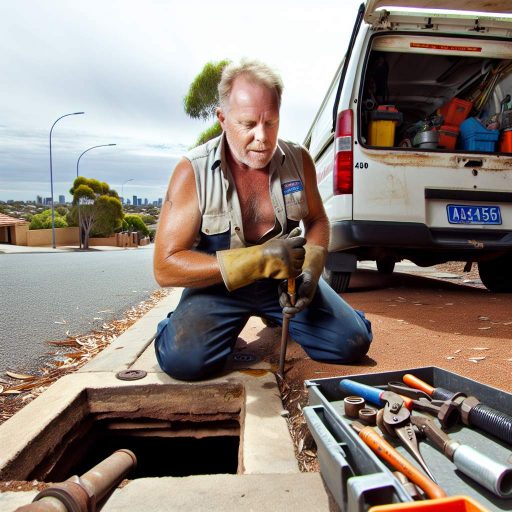Introduction
Importance of skilled labor in Australia’s economy
Skilled labor holds a vital place in Australia’s economy.
It drives innovation, improves efficiency, and fosters growth across various sectors.
As industries continue to evolve, the demand for trades jobs increases significantly.
Skilled trades workers are essential in construction, manufacturing, and maintenance, ensuring that projects are completed safely and efficiently.
Current job market landscape and demand for trades jobs
Currently, the job market for trades roles in Australia is robust.
Economic growth and infrastructure investments diversify opportunities across the country.
Skilled labor shortages have developed in numerous sectors, with employers actively seeking qualified tradespeople.
Recent surveys indicate that over 70% of businesses struggle to find skilled workers.
This trend underscores the necessity for trades training and apprenticeships.
Types of trades jobs covered in the post
This blog post explores various types of trades jobs essential to Australia’s workforce.
Electricians, plumbers, carpenters, and welders are among the most in-demand roles.
Each of these positions offers a rewarding career with competitive salaries and various work opportunities.
Electricians play a crucial role in today’s tech-driven society.
They install, maintain, and repair electrical systems, ensuring safety and functionality.
As renewable energy sources gain popularity, the demand for skilled electricians continues to grow.
Plumbers are vital for maintaining essential systems in residential and commercial settings.
They handle everything from minor repairs to major installations, making their expertise indispensable.
With new housing developments and renovations on the rise, plumbers will remain in high demand.
Carpenters bring architectural designs to life.
They construct, install, and maintain structures using wood and other materials.
Their craftsmanship is key to the success of construction projects, making them invaluable to the industry.
Welders are skilled metalworkers who join and fabricate metal parts.
They work in numerous industries, including construction and manufacturing.
As technology advances, the need for skilled welders who can handle complex projects will only increase.
In short, skilled trades jobs are essential to Australia’s economy.
The ongoing demand ensures that these roles offer promising career prospects and stability for workers.
Understanding Skilled Labor in Australia
Definition and Significance of Skilled Labor Roles
Skilled labor encompasses jobs that require specific trade skills and expertise.
These roles generally involve hands-on work and specialized knowledge.
Skilled laborers are essential for many industries in Australia.
They possess the training and experience to perform complex tasks efficiently.
Without skilled labor, many sectors would struggle to function effectively.
In Australia, skilled labor roles significantly contribute to economic growth and development.
These jobs provide the backbone for various sectors, including construction, manufacturing, and healthcare.
Skilled workers bring valuable knowledge and technical capabilities to their fields.
Their expertise drives innovation and helps improve service quality across the board.
Moreover, workforce demands continue growing, emphasizing the importance of skilled labor.
The advancement of technologies further accelerates this need.
Employers seek individuals who can adapt and thrive in ever-changing environments.
Thus, investing in skilled labor roles is a priority for Australia’s economy.
Trade Sectors Thriving in Australia
Australia boasts several thriving trade sectors where skilled labor roles are in high demand.
These sectors contribute significantly to the country’s overall productivity.
Here are some of the leading trade sectors:
- Construction: This sector remains one of the largest employers of skilled labor in Australia.
Construction workers, electricians, and plumbers are just a few examples of skilled roles.
These professionals build and maintain infrastructure vital to communities. - Manufacturing: Skilled laborers in manufacturing are pivotal for producing goods.
Machinists, welders, and production operators are essential for ensuring quality and efficiency. - Automotive Repair: Skilled automotive technicians are crucial for maintaining vehicle safety and performance.
They diagnose and repair mechanical issues to ensure road safety. - Healthcare: Roles in healthcare, such as nurses and allied health professionals, are integral to maintaining public health.
These skilled workers provide necessary care and support to patients. - Hospitality: The hospitality sector relies on chefs, waitstaff, and hospitality managers.
Skilled labor helps ensure excellent service and customer satisfaction. - Information Technology: Skilled IT professionals develop and maintain technology solutions.
Their expertise is vital for businesses looking to leverage digital tools.
Importance of Trades Jobs in Contributing to Australia’s Infrastructure and Services
Trades jobs are fundamental to the construction and maintenance of infrastructure in Australia.
Quality roads, bridges, and public buildings rely heavily on skilled labor contributions.
Without these tradespeople, infrastructure projects would face significant delays and quality issues.
Furthermore, the maintenance of essential services depends on skilled labor roles.
Electricians ensure safe and reliable electricity supply in homes and businesses.
Plumbers maintain water supply systems and manage waste disposal.
These trades ensure that basic needs are met effectively.
Moreover, skilled laborers play a critical role during emergencies.
Electricians restore power after outages.
Plumbers address urgent repairs in water supply systems.
Their skills contribute to both immediate crisis management and long-term recovery efforts.
Your Personalized Career Strategy
Unlock your potential with tailored career consulting. Get clear, actionable steps designed for your success. Start now!
Get StartedThe importance of skilled labor extends to economic resilience as well.
During economic downturns, skilled trades provide stable employment opportunities.
These roles offer pathways to self-employment and entrepreneurship.
Many skilled workers start their businesses, contributing to local economies.
Skilled Labor: Key to Community Development and Sustainability
Additionally, skilled laborers significantly impact community well-being and development.
They help build and maintain vital infrastructure that enhances quality of life.
Parks, schools, and recreational facilities all require skilled workers for construction and maintenance.
Furthermore, skilled trades promote sustainable practices.
Electricians implement energy-efficient systems in buildings.
Plumbers install water-saving fixtures to promote conservation.
Skilled labor contributes to a greener future by reducing resource wastage.
In essence, understanding skilled labor roles in Australia is crucial.
These roles encompass a wide range of sectors that contribute significantly to the economy.
Skilled laborers possess the expertise and knowledge needed for various trades, ensuring the smooth functioning of many services and infrastructures.
The importance of skilled labor in Australia cannot be overstated.
It fosters economic growth and encourages sustainable practices.
Skilled trades provide a pathway to stable employment, benefiting both workers and communities.
As industries evolve, the demand for skilled labor will continue to rise, making it essential to invest in and support these careers.
High-Demand Trades Jobs
Australia is witnessing a surge in demand for skilled trades jobs.
Many industries face challenges in finding qualified professionals.
Several factors drive this increased demand, including population growth and urban development.
This section highlights the top trades jobs experiencing high demand, the contributing factors, and regions where opportunities are flourishing.
Top Trades Jobs Currently Experiencing High Demand
- Electricians: Electricians are crucial for residential, commercial, and industrial settings.
Their role encompasses installing, maintaining, and repairing electrical systems. - Plumbers: Plumbers play a vital role in construction and renovation projects.
They handle everything from installing piping systems to repairing water heaters. - Carpenters: Carpenters contribute to diverse projects, from building homes to creating custom furniture.
Their skills in woodworking are highly sought after. - Welders: Welders are essential in manufacturing and construction.
They join metal components to create strong structures and machinery. - HVAC Technicians: HVAC technicians specialize in heating, ventilation, and air conditioning systems.
They ensure comfortable indoor environments in residential and commercial spaces. - Bricklayers: Bricklayers are instrumental in the construction industry.
They build walls, chimneys, and other structures using brick and masonry materials. - Roofers: Roofers focus on installing and repairing roofing systems.
They work with various materials, ensuring buildings remain water-tight and energy-efficient.
Factors Contributing to Increased Demand
Understanding the factors driving demand helps explain the current job market.
Population growth is a significant contributor.
Australia’s population continues to rise, creating a pressing need for housing and infrastructure.
Urban development plays a critical role as well.
Cities are expanding, and businesses are growing.
Investment in construction and renovation projects fuels the demand for trades professionals.
Technological advancements also influence the industry.
New technologies require specialized skills.
Electricians and HVAC technicians, for example, must be familiar with smart systems.
Additionally, a lack of skilled labor drives up demand.
Many tradespeople are nearing retirement age, creating gaps in the workforce.
As older generations retire, industries struggle to find replacements.
Government initiatives aimed at boosting skilled immigration add another layer.
Programs targeting trades professionals attract foreign talent.
This influx helps meet the high demand for skilled labor.
Regions and Industries Where Demand is Soaring
Different regions in Australia experience varying levels of demand for trades jobs.
Urban areas, particularly major cities, see significant growth.
The demand for housing and infrastructure remains high in Sydney and Melbourne.
In Perth, mining and resource industries create opportunities for welders and electricians.
The state’s economic activity is closely tied to its natural resources.
Thus, skilled tradespeople are essential to support this sector.
Brisbane also offers many opportunities in construction and renovation projects.
Urban renewal initiatives have driven demand for electricians, plumbers, and carpenters.
The city’s growth leads to an ongoing need for trades professionals.
Stand Out with a Resume That Gets Results
Your career is worth more than a generic template. Let us craft a resume and cover letter that showcase your unique strengths and help you secure that dream job.
Get HiredRegional areas are not left behind, either.
Smaller towns often experience a shortage of skilled labor.
These locations require tradespeople for various projects, from schools to new housing developments.
Skilled Trades: A Growing Opportunity in Australia’s Sustainable Future
The Australian construction industry plays a pivotal role in creating jobs.
With a focus on sustainable building practices, tradespeople equipped with green skills are in high demand.
Electricians and plumbers knowledgeable in eco-friendly systems are particularly valuable.
Moreover, the healthcare sector relies on skilled trades jobs.
Technicians specializing in HVAC systems ensure comfortable and safe environments in hospitals.
Plumbers handle essential services critical to health and safety.
As the demand for renewable energy grows, electricians skilled in solar energy installations are increasingly sought after.
The transition towards sustainable technologies is reshaping job requirements across industries.
Those who adapt to these changes will find promising career opportunities.
The construction of new schools, hospitals, and public infrastructure contributes to job growth.
Skilled tradespeople will play a crucial role in supporting these projects.
As cities continue to develop, the need for electricians, plumbers, and carpenters will only rise.
In a nutshell, the outlook for trades jobs in Australia remains bright.
With population growth, urban development, and technological advancements, skilled trades will continue to be in high demand.
Regions such as Sydney, Melbourne, and Brisbane present numerous opportunities for those within the industry.
As the nation seeks to bolster its workforce, trained tradespeople will find many pathways to a successful career.
Investing in trade skills is crucial, as these roles contribute significantly to the economy.
Those considering a career in skilled trades will find a landscape rich with opportunity, growth, and stability.
Read: Landscaping ROI: What Aussies Should Know
Electricians: The Backbone of Electrical Services
Role and Responsibilities of Electricians
Electricians play a crucial role in our society.
They ensure that homes, businesses, and infrastructures operate safely with electricity.
Their work involves installing, repairing, and maintaining electrical systems.
Electricians are responsible for various tasks, including:
- Installing wiring systems in new buildings.
- Repairing faulty electrical systems.
- Upgrading existing electrical systems to meet safety codes.
- Conducting regular inspections of electrical systems.
- Reading and interpreting blueprints and technical diagrams.
- Understanding and adhering to safety regulations.
In addition to these tasks, electricians often collaborate with other trades.
They work alongside contractors, builders, and other professionals to ensure electrical installations are performed seamlessly.
Required Qualifications and Pathways to Becoming an Electrician
Becoming an electrician in Australia requires specific qualifications and training.
This career demands a combination of formal education and hands-on experience.
Here is a typical pathway to becoming successful in this trade:
- Complete secondary school education with a focus on mathematics and physics.
- Enroll in a Certificate III in Electrotechnology Electrician course.
- Gain experience through an apprenticeship program, lasting about four years.
- Obtain a licensed electrician certificate after completing the apprenticeship.
- Consider further specialization through additional courses or certifications.
During apprenticeships, aspiring electricians gain valuable onsite experience.
This experience is essential for practical skills and understanding real-world applications.
Transform Your LinkedIn for Maximum Impact
Elevate your professional brand with a LinkedIn profile that attracts recruiters, showcases your expertise, and maximizes opportunities. Stand out in your industry with a profile built for success.
Boost ProfileOnce they complete their training, electricians often pursue additional certifications.
These certifications can help them specialize in areas like renewable energy systems or industrial electrical work.
Salary Expectations and Job Security in the Electrician Trade
Electricians enjoy competitive salary packages.
They can earn well, especially as they gain experience and specialize.
Salary expectations for electricians in Australia can vary based on several factors:
- Level of experience: Entry-level electricians typically earn lower wages than seasoned professionals.
- Location: Electricians in urban areas often earn more than those in rural settings.
- Type of work: Specialized electricians may command higher salaries due to their technical skills.
On average, electricians in Australia earn between AUD 60,000 to AUD 100,000 annually.
Experienced electricians can earn even more, especially if they take on leadership roles or start their businesses.
Job security for electricians is strong in Australia.
The demand for skilled workers continues to grow.
Factors contributing to this demand include the rise of new construction and infrastructure projects.
The increasing focus on renewable energy also boosts job opportunities.
Electricians who specialize in solar and wind energy systems are particularly sought after.
These sectors continue to expand, providing additional job security for electricians.
In fact, electricians serve as the backbone of electrical services in Australia.
Their essential skills ensure that electrical systems operate safely and effectively.
Anyone interested in pursuing a career in this trade has a clear pathway.
With the right education, experience, and specialization, a successful career awaits.
The demand for qualified electricians remains strong.
This trend will likely continue as society relies more on electrical systems.
Therefore, this field offers promising job security and financial stability for aspiring tradespeople.
Read: Health & Safety Tips for Aussie Welders
Essential for Residential and Commercial Facilities
Plumbing Tasks and Challenges
Plumbers play a crucial role in maintaining the infrastructure of both residential and commercial properties.
They handle various tasks that keep our water systems functioning properly.
These tasks include installation, repair, and maintenance of pipes, fixtures, and fittings.
- Plumbers install water supply and drainage systems.
- They repair leaks in pipes and fixtures.
- Plumbers are responsible for unclogging drains and toilets.
- They install water heaters, dishwashers, and washing machines.
- They assess plumbing systems for code compliance.
- Plumbers often read and interpret blueprints for renovations.
Despite the essential nature of their work, plumbers face significant challenges.
The job can be physically demanding, requiring lifting heavy materials and working in confined spaces.
Additionally, plumbing issues often arise unexpectedly, demanding swift action.
Plumbers must also navigate various building codes and regulations.
This complexity requires continuous education to stay updated.
Education and Certification Requirements for Aspiring Plumbers
Pursuing a career in plumbing involves specific educational and certification steps.
First, aspiring plumbers typically complete a pre-apprenticeship program.
This program equips them with foundational knowledge about plumbing systems.
Next, individuals enter a plumbing apprenticeship.
Apprenticeships generally last four years and combine on-the-job training with classroom instruction.
During this time, apprentices learn from experienced plumbers.
They gain hands-on experience while mastering technical skills.
- Completing a Certificate III in Plumbing is a key requirement.
- Apprentices must also obtain a plumbing license for work.
- Many states require ongoing education to maintain licensing.
Additionally, aspiring plumbers must develop specific skills.
Strong problem-solving abilities are essential in diagnosing plumbing issues.
Effective communication skills also help in dealing with clients and contractors.
Attention to detail is crucial for ensuring all installations meet safety standards.
Future Outlook and Earnings Potential for Plumbers in Australia
The future outlook for plumbers in Australia remains promising.
The demand for skilled labor in the plumbing sector is steadily increasing.
Population growth and infrastructure development drive this demand.
As new residential and commercial buildings emerge, the need for plumbing services escalates.
Moreover, the plumbing industry is evolving.
Advances in technology, such as smart plumbing systems, require skilled professionals who can adapt.
Plumbers who embrace new technologies will have a competitive advantage.
Those specializing in green plumbing and sustainable practices should find ample opportunities.
Regarding earnings, plumbers in Australia enjoy competitive salaries.
Several factors influence their income, including location, experience, and specialization.
On average, licensed plumbers earn between AUD 60,000 to AUD 80,000 annually.
However, experienced plumbers or those in managerial positions can earn even more.
- Entry-level plumbers typically earn around AUD 50,000 per year.
- Plumbers with 5-10 years of experience can earn between AUD 70,000 and AUD 90,000.
- Highly skilled tradespeople can exceed AUD 100,000 annually.
The vibrant job market and ongoing need for plumbing services make this career a sound choice.
Plumbers have excellent job security due to their essential expertise.
As more individuals recognize the importance of plumbing systems, the profession will continue to thrive.
Therefore, plumbers are integral to maintaining healthy and functional environments.
They face various tasks and challenges in their daily work.
Aspiring plumbers need proper education and training to succeed in this field.
With a promising future and solid earning potential, plumbing remains a top skilled labor job in Australia.
Investing in this career can lead to both personal and financial rewards, making it a worthy choice for those seeking stability and opportunity.
Read: Sustainable Landscaping in Australian Cities

Construction Workers: Building the Future
The construction industry plays a pivotal role in Australia’s economy.
Its diverse job opportunities attract many skilled workers.
Various roles within the construction sector offer unique experiences and career paths.
Let’s explore some of these roles, necessary skills, and the industry’s growth.
Various Roles Within the Construction Industry
Construction workers are vital to any project.
They ensure that buildings, roads, and other structures meet safety standards.
Here are some key roles within the construction industry:
- Carpenters: Carpenters construct and repair wooden structures.
This includes framing, roofing, and cabinetry. - Masons: Masons work with bricks, stones, and concrete.
They build walls, patios, and other structures that require strong foundations. - Bricklayers: Bricklayers specialize in laying bricks.
They create durable walls and facades. - Electricians: Electricians install electrical systems.
They ensure buildings have proper wiring, lighting, and power supply. - Plumbers: Plumbers install pipes and fixtures.
They handle water, gas, and sewage systems. - Heavy Equipment Operators: These workers operate machinery like cranes and bulldozers.
They play a critical role in moving materials and shaping landscapes. - Construction Laborers: Laborers perform various tasks as needed on job sites.
They assist skilled tradesmen and help with physical work. - Site Managers: Site managers oversee construction projects.
They ensure projects run smoothly and meet deadlines.
Skills Necessary for Different Construction Jobs
Each construction role requires specific skills and competencies.
Workers need a mix of technical and soft skills to succeed.
Here’s a breakdown of essential skills for various construction jobs:
Carpentry
- Precision and attention to detail are crucial.
- Understanding of blueprints and technical drawings is necessary.
- Basic math skills help in measuring and cutting materials.
Masonry
- Physical strength is essential for lifting heavy materials.
- Knowledge of different types of stones and bricks is necessary.
- Skills in mixing mortar and laying it effectively are critical.
Electrician
- Understanding electrical systems and codes is vital.
- Problem-solving skills help troubleshoot issues.
- Attention to detail ensures safety and compliance with regulations.
Plumbing
- Knowledge of plumbing codes and regulations is necessary.
- Physical stamina is important for long, demanding hours.
- In-depth understanding of water systems helps with installations.
Heavy Equipment Operation
- Certification to operate machinery is often required.
- Good hand-eye coordination is essential for safe operation.
- Awareness of safety regulations is crucial to prevent accidents.
Overview of Construction Job Growth and Economic Impact
The construction sector significantly impacts Australia’s economic landscape.
The demand for skilled labor is steadily increasing due to potential growth in infrastructure projects.
Here are key points illustrating this impact:
Job Growth
- According to the Australian Government, the construction industry is projected to grow.
This growth equates to thousands of new job opportunities. - Infrastructure projects, such as roads and bridges, drive demand for various trades.
- Residential construction continues to boom, creating jobs for numerous skilled trades.
Economic Contribution
- The construction industry contributes significantly to the GDP of Australia.
- Every dollar spent in construction generates additional economic activity and jobs.
- Investments in housing and infrastructure improve living standards and community welfare.
Regional Development
- Construction projects stimulate local economies, particularly in rural areas.
- By boosting local businesses, the construction sector promotes economic growth.
- Infrastructure enhances access to services, improving quality of life for residents.
The Australian construction industry presents vast opportunities for skilled workers.
With ongoing demand, now is the perfect time to explore this field.
By acquiring the necessary skills and qualifications, you can secure a rewarding career in construction.
The industry’s economic impact only enhances its appeal.
As Australia continues to grow, so does the need for individuals ready to build its future.
Read: Soil Types and Landscaping in Australia
HVAC Technicians: Keeping Systems Running
HVAC technicians play a crucial role in maintaining indoor environments.
They focus on heating, ventilation, and air conditioning systems.
These professionals ensure that homes and businesses stay comfortable throughout the year.
Their work spans numerous industries, including residential, commercial, and industrial settings.
Understanding HVAC Roles
HVAC stands for heating, ventilation, and air conditioning.
Technicians specialize in installing, maintaining, and repairing these systems.
Their responsibilities cover various tasks, including:
- Installing HVAC units and ductwork
- Performing routine maintenance to improve system efficiency
- Troubleshooting and diagnosing system issues
- Repairing or replacing faulty components
- Ensuring compliance with safety regulations
These tasks often involve working with complex machinery and electronic controls.
Technicians also handle refrigerants and other chemicals safely, adhering to environmental regulations.
The Importance of Green Technology in HVAC
Green technology has revolutionized the HVAC industry.
As climate change concerns grow, energy efficiency becomes increasingly important.
HVAC technicians now focus on eco-friendly practices, contributing to sustainable solutions.
Implementing green technology offers several benefits, including:
- Lower energy consumption, resulting in reduced utility bills
- Minimized environmental impact through reduced carbon emissions
- Enhanced indoor air quality, promoting healthier living and working conditions
- Increased marketability of properties equipped with energy-efficient systems
As a result, HVAC technicians must stay updated on the latest sustainable practices.
They should understand renewable energy sources and advanced technologies.
Key developments include:
- Solar thermal systems for heating
- Geothermal heat pumps for efficient heating and cooling
- High-efficiency HVAC units with advanced controls
- Smart home technology integration for energy management
Essential Skills for HVAC Technicians
To excel as an HVAC technician, individuals must develop a specific set of skills.
Technical proficiency is vital for understanding complex systems.
Here are crucial skills required:
- Strong mechanical aptitude and problem-solving abilities
- Knowledge of HVAC systems, tools, and equipment
- Familiarity with electrical systems and plumbing
- Excellent communication skills for client interactions
- Ability to work independently and in teams
Additionally, hands-on experience through apprenticeships or vocational training proves essential.
Technicians benefit from working under experienced professionals.
This mentorship helps them gain insights and practical knowledge.
Certifications and Qualifications
Certifications enhance an HVAC technician’s credibility in the field.
Relevant qualifications vary by region, but common certifications include:
- EPA Section 608 Certification for refrigerant handling
- NATE (North American Technician Excellence) certification for performance and competency
- HVAC Excellence certification for reliable testing and skills assessments
- State-specific licenses based on local regulations
Continuing education keeps technicians updated with industry advancements.
Many providers offer training courses and workshops.
Ongoing learning enhances a technician’s skill set, making them more competitive in the job market.
Career Outlook for HVAC Technicians
The demand for skilled HVAC technicians continues to grow in Australia.
Factors driving this demand include:
- Population growth leading to increased housing and commercial needs
- Regulatory push for energy-efficient heating and cooling solutions
- The expanding installation of green technology in buildings
- Ongoing maintenance and repair services required for existing systems
These trends indicate strong job prospects for individuals entering the field.
As companies seek technicians with green technology expertise, opportunities will continue to expand.
Becoming an HVAC technician offers a rewarding career path.
This skilled labor role provides job security and growth in a rapidly evolving industry.
With the emphasis on green technology, technicians play a vital role in shaping sustainable practices.
Aspiring HVAC professionals should focus on gaining experience, certifications, and staying informed on industry changes.
As Australia moves toward a more sustainable future, HVAC technicians will remain essential.
Their knowledge and skills will help transform how we manage indoor climates.
A career in HVAC not only promises personal growth, but also contributes to a healthier planet.
Other Emerging Trades Jobs to Consider
In today’s evolving job market, traditional trades have expanded to encompass many exciting roles.
Not only do these positions offer stable employment, but they also pave the way for rapid growth and innovation.
When considering job opportunities, it’s essential to explore less traditional but emerging trades.
Let’s delve into some of these roles.
Emerging Trade Roles in Australia
Beyond the conventional trades we often think of, several emerging roles have gained traction in Australia.
These positions may not be as widely recognized but play a vital role in the economy.
- Automotive Technicians: With advancements in vehicle technology and electric cars gaining popularity, the demand for skilled automotive technicians has surged.
These professionals diagnose, repair, and maintain vehicles, ensuring they run efficiently. - Landscapers: As more Australians prioritize outdoor aesthetics and environmental sustainability, landscapers have seen increasing demand.
They design and create outdoor spaces, enhancing both beauty and functionality. - Solar Panel Installers: The shift towards renewable energy has opened doors for solar panel installers.
These experts are responsible for installing solar energy systems, catering to the growing eco-conscious market. - Cycling Mechanics: With the rise of cycling as a popular mode of transport and recreation, skilled mechanics are essential.
They perform bicycle repairs and maintenance, supporting the growing cycling community. - Home Automation Technicians: Smart home technology is on the rise, creating opportunities for technicians who install and maintain these systems.
They help homeowners customize their environments for convenience and efficiency.
The Importance of Adaptability
The emergence of these new trades underscores the importance of adaptability in the workforce.
Skilled labor roles often require a willingness to learn and adjust to changes in technology and consumer demands.
Workers must embrace continuous education to remain relevant in their fields.
- Upskilling: Many industries offer training programs for workers looking to expand their skill sets.
Regular engagement in professional development can lead to new job opportunities. - Certifications: Obtaining certifications in specialized areas can set you apart from others.
Certified professionals often attract higher wages and better job prospects. - Networking: Engaging with industry peers through associations or forums can provide insights and opportunities.
Networking helps professionals stay informed about industry trends and job openings.
Technological Advancements and Their Impact
The evolving landscape of trades is largely influenced by technological advancements.
Emerging tools and processes are changing how tradespeople work.
As a result, adapting to these changes is crucial for success in these roles.
- Automation: Many traditional tasks are being automated.
Skilled workers must learn to work alongside machines to enhance productivity. - Digital Tools: Software solutions streamline processes, from project management to billing.
Tradespeople need to familiarize themselves with these tools to remain competitive. - Innovative Materials: New materials, such as eco-friendly composites, are revolutionizing how tradespeople approach their jobs.
Staying informed about material advancements is vital.
The roles of automotive technicians, landscapers, and solar panel installers are just the beginning.
Numerous opportunities await those willing to embrace innovation and change.
As the industry evolves, skilled laborers equipped with the right knowledge will thrive.
Australia’s trades sector is experiencing significant growth due to emerging roles and new technologies.
Professionals in these fields must be open to learning and adapting.
The journey in trades is an exciting one.
By taking advantage of new opportunities, individuals can secure fulfilling careers in this ever-changing landscape.
Conclusion
Pursuing a career in trades in Australia offers immense opportunities.
Skilled labor roles are essential for the nation’s economy.
They contribute significantly to infrastructure and community development.
As industries grow, the demand for skilled tradespeople increases.
Trade careers provide job security and financial stability.
Many trades offer competitive salaries and benefits.
Additionally, skilled tradespeople often enjoy high levels of job satisfaction.
Working with your hands can be fulfilling and rewarding.
As you consider your career options, explore various trade paths.
Each trade has unique requirements and opportunities.
Reflect on your interests and aptitudes to find the right fit.
Whether plumbing, electrical work, or carpentry, there’s a trade for everyone.
Engaging in trades training programs can open doors to rewarding careers.
These programs equip you with the necessary skills and knowledge.
They often include hands-on training, which helps you gain practical experience.
Many vocational training institutes offer support and resources to students.
The societal impact of skilled labor is profound.
Skilled tradespeople play a crucial role in building a sustainable future.
They create and maintain essential services that people rely on daily.
Investing in trades education fosters innovation and growth in various sectors.
In closing, pursuing a career in trades is a wise choice.
It not only benefits you personally but also contributes to the wider community.
Embrace the challenge and embark on a journey in skilled labor.
Your future in the trades awaits, filled with promise and potential.




